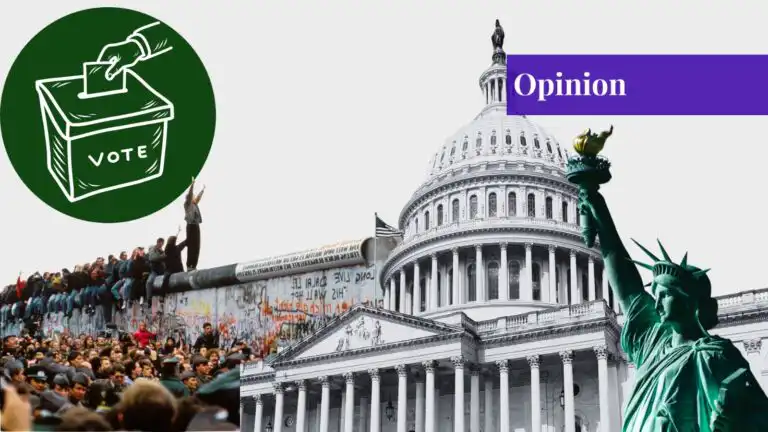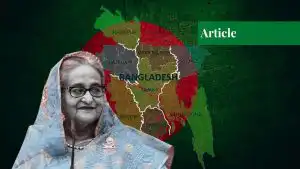In the year 1969, Carl Ogelsby coined the famous terms Global North and Global South to describe the relationship between the affluent and industrialized North and the intolerable social order they created to dominate the South. This “Global North vs Global South divide,” however, extends far beyond economics. It characterized a primary geographical division that became a legacy of colonialism. By the early 20th century, the states in the Global North had colonized nearly 85% of the world’s habitable land, and during this period, they directed a mass cultural export to the South. From social values to economic and political systems, the colonies underwent significant cultural transformations. According to post-colonial authors, democracy is a part of the same package, a political system wrapped in universality that was unanimously adopted during the decolonization period. However, decades after the transition, the cracks in this universalist ideal have become more evident, giving rise to a critical question. Is democracy actually a truly universal system, or does it continue to serve as an instrument of imperial dominance in a postcolonial world?
Democracy and Its Hidden Imperial Roots
Democracy emerged as a form of government gradually in the Global North, with its liberal form gaining popularity, particularly after the Enlightenment era, which was grounded in ideals of participation, rule of law, and individual rights. However, in reality, this universalism disguised imperial ambitions. Colonial administrators saw their domination as more of a civilizing mission, with the duty to uplift the depressed masses. This was achieved through the promotion of Western law, education, and institutions as the only pathway to progress. Many liberal theorists, like John Locke and Immanuel Kant, depicted democracy as advocating for liberty and equality, while simultaneously providing ideological justifications for colonialism through reinforcing racial and cultural hierarchies in their works.
This meant that even though liberalism and democracy espoused equality and freedom on the outside, these universal claims were shattered in the face of colonial and expansionist tendencies. An example of this in South Asia is how many indigenous, long-standing local bodies, such as village councils or panchayats, were gradually scaled up into British-style administrative units. Even though the British had promised to respect traditional Indian customs following the War of Independence in 1857, gradually, British mores, beliefs, and customs kept penetrating into local governance models. This cultural intrusion, wrapped as being fairly altruistic, was brought about by reforms and colonial laws. However, the indigenous governance systems were largely replaced by the time the country gained independence. The wider colonial project had hence succeeded in de-legitimizing India’s own governance traditions and mores.
Democracy in the Post-Colonial Era
The post-war period witnessed an increasingly strong push to promote democracy on the global stage. It became the moral language of political legitimacy, grounded in legal rights and the rule of law. This helped it sustain global hierarchies since the Global North became the democratic exemplars, and the South was painted as chronically lacking these characteristics. In practice, many of the democratic institutions were imposed in a way that served colonial interests even in the post-colonial era. According to a study, the rise of liberal institutionalism along with democracy gave Western agencies, such as the IMF and World Bank, the authority to create good governance ideals, which deepened inequality in the guise of modernization. Democracy in the post-war era, particularly in the Cold War, functioned as a neo-imperial doctrine used as a yardstick by the Global North, where the regimes that aligned with Western powers were upheld as democratic exemplars and others were isolated, punished, or even toppled in the name of promoting freedom..
Pakistan and Its Recurring Democratic Failures
Pakistan inherited a democratic system by default at the time of its independence, but its colonial legacy had already hollowed out indigenous administrative traditions. As a result, Pakistan had to inherit procedural democracy from the British without cultivating local social and political foundations. For Pakistan, its tensions with democracy have consistently surfaced through history. Since its inception, no Pakistani Prime Minister has ever completed a full term in office. Political instability has been constant, with periods of civilian rule being cut short by military-led authoritarian regimes. A deeper analysis of the failure of democracy in Pakistan reveals important observations.
Pakistan has a history of elite-dominated politics, with the majority of its political parties still directly influenced by or holding ties to family dynasties or powerful landowners. As a commentator observes, “true democracy has never been practiced in the country” because political parties lack internal democracy, and a few elite families essentially “have captured the country.” This suggests that elected legislatures ultimately fracture under patronage.
The politicization of civilian institutions further undermines the rule of law. This stems from the lack of an understanding that politics and administration are connected deeply within the Pakistani context, whereas modern administrative systems clearly dichotomize them. This has led to widespread cynicism and weak public trust in the state. Without strong rule-of-law and accountability mechanisms, democratic competitions keep sliding into back-room power games.
The South-Asian political landscape also features strong patron-client relationships. Given this colonial context, colonial and post-colonial states do not invest in broad-based civic education because the elites benefit from keeping political knowledge limited and concentrated. Democracy as an institution in Pakistan was designed without parallel efforts to build democratic literacy or engagement mechanisms. In addition to this, Western democracy was born into a relatively culturally homogenous and secular society, which presumes a relatively neutral public sphere. Democracy’s institutional design presumes that citizens would relate to the state as individuals, not as members of a religious, ethnic, or linguistic group.
In contrast, the societies in the Global South, particularly Pakistan, possess layered identities that all heavily shape social life. With the Western model of democracy being transplanted here, all these identities have been largely ignored. This helps understand why Pakistani citizens feel stronger toward kinship, sectarian, or ethnic affiliations rather than the abstract state, a dynamic that the liberal model was never designed to accommodate.
Other Parallels
Pakistan’s democratic struggles are, however, not unique. The transplantation of democratic frameworks has, however, produced hybrid and fragile systems across the global South. A prominent example would be Bangladesh, a former British colony, which has oscillated between civilian and military rule. Two of its main political parties, the Awami League and the BNP, have a strong influence of family dynasties, which has given democracy a weak imprint there. In Zimbabwe, another postcolonial state, democracy has been hollowed out by decades of authoritarian entrenchment, where President Mugabe was finally ousted after 37 years in office, but was succeeded by another despot in Mugabe’s hold. These cases show how imported democratic institutions, stripped of legitimacy, often replicate the same hierarchies they were meant to dismantle.
Conclusion
Post-colonial theorists argue that the internationalized version of democracy cannot be studied as a neutral or universally good system. Western democracy’s claim to universality is ‘deeply contradictory’ because this very tradition that championed democracy produced ‘slavery, empire, and racial exclusion’. Democracies in the global South were often subservient to foreign interests, and they continue to do so today. Some post-colonial thinkers have called for the decolonization of democracy, which argues that Eurocentric standards should not measure its effectiveness. Rather, they advocate for democracy to become “pluriversal,” which would allow multiple coexisting models rooted in each society’s own governance standards. According to this view, universality is bound to fail because it lacks local contexts; instead, democracy should be rebuilt from the ground up to allow for the local political cosmologies to be reflected.
Ultimately, democracy has revealed both its promise and its paradox. Even though it has long been portrayed as a universal value, time after time this facade has lifted to uncover the systemic problem of reproducing imperial epistemologies. For countries like Pakistan, with a rather tough history, it is important to rethink how democracy can be re-imagined to strengthen local political realities rather than antagonizing them. There is also a need to rethink how local institutions can be strengthened to uplift democratic norms.
If you want to submit your articles and/or research papers, please visit the Submissions page.
To stay updated with the latest jobs, CSS news, internships, scholarships, and current affairs articles, join our Community Forum!
The views and opinions expressed in this article/paper are the author’s own and do not necessarily reflect the editorial position of Paradigm Shift.





